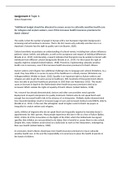Assignment 4 Topic 1:
Grace Kaspersma
"Additional budget should be allocated to ensure access to culturally sensitive health care
for refugees and asylum seekers, even if this increases health insurance premiums for
Dutch citizens"
The reality is that the number of people in Europe with a non-European migration background is
increasing and will continue to increase. That is the first reason why culturally sensitive care is so
important. Everyone has the right to quality care (van Buuren, 2020).
Cultural sensitivity necessitates an understanding of cultural variety, including how culture influences
patients' values, beliefs, and attitudes, as well as the acceptance and respect of individual differences
(Brooks et al., 2019). Unfortunately, research indicates that therapists may be unable to interact with
individuals from different cultural backgrounds (Brooks et al., 2019). For this reason the right of
equality might be violated (United Nations, 1948). Therefore, implementing culturally sensitive
health care is necessary, even if this increases health insurance premiums for Dutch citizens.
Asylum seekers and refugees face additional challenges due to language and cultural limitations. As a
result, they have little or no access to some of the healthcare in a timely manner (Ministerie van
Volksgezondheid, Welzijn en Sport, 2022). Equality is an important right so Asylum seekers and
refugees are able to get the same access to healthcare. Still, hundreds of thousands Dutch citizens
were not able to pay their healthcare premiums in 2020 (Hart van Nederland, 2022). This would
cause an increase in depth in the Netherlands when health insurance premiums need to be
increased. Which violates the rights of equality of Dutch citizens (United Nations, 1948).
Yet, research has already demonstrated, doctors and other care providers need a greater
deployment of expert interpreters for quality treatment. Patients who do not speak Dutch well
enough face increased health risks in the absence of an interpreter. Multiple studies demonstrated
how misunderstandings result in increased usage of care and increased medical costs (KNMG, 2022 &
(Devillé et al., 2011). In the end, this will eighter result in higher costs for Dutch tax payers or
inequality for asylum seekers and refugees.
Lastly, children of migrants who do not speak Dutch are frequently required to translate doctor’s
appointments for their parents. Many people experience this later in life as a fear of failure (Ballan,
2021). Article 32 of the Convention on the Rights of the Child, which the Netherlands has signed,
specifies that children are not permitted to do labour that is harmful or causes them to miss school.
Despite this, many children avoid school on a daily basis to work as free interpreters, endangering
their own health (United Nations, 1989).
In conclusion, Dutch citizens should pay more health insurance premiums to insure culturally
sensitive health care. In the end the responsibility is to enormous to place the health of parents in
the hands of children.




